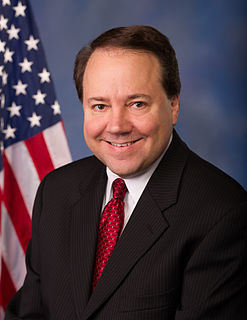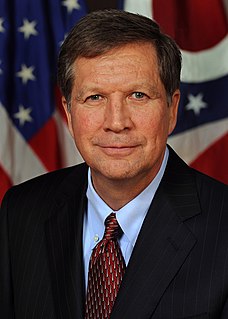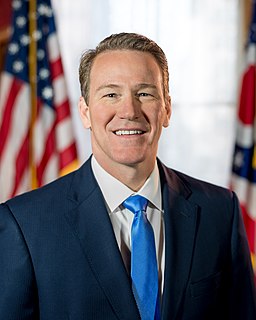Related Research Articles

Richard Michael DeWine, known as Mike DeWine, is an American politician and attorney currently serving as the governor of Ohio. A member of the Republican Party, DeWine is a former United States Senator, elected in 1994 and re-elected in 2000. In 2006, DeWine ran for re-election to a third term, but was defeated by the Democratic nominee, U.S. Representative Sherrod Brown. DeWine had served as Lieutenant Governor of Ohio under George Voinovich from 1991 until 1994. In 2010, DeWine was elected Ohio Attorney General, defeating Democratic incumbent Richard Cordray, and was re-elected for a second term in 2014. In the 2018 gubernatorial election, DeWine was elected Governor of Ohio, defeating Cordray in a rematch of their 2010 race.

Patrick Joseph Tiberi is an American lobbyist and politician who served as the U.S. Representative for Ohio's 12th congressional district from 2001 to 2018. His district included communities north and east of Columbus. He is a member of the Republican Party, and previously served in the Ohio House of Representatives from 1993 to 2000. He briefly served as Chair of the new Republican Main Street Congressional Caucus from September 7, 2017.

John Richard Kasich Jr. is an American politician, author, and television news host who served as the 69th Governor of Ohio from 2011 to 2019. He is a Republican and unsuccessfully sought the party's presidential nomination in 2000 and 2016.

The Marijuana Policy Project (MPP) is the largest organization working solely on marijuana policy reform in the United States in terms of its budget, number of members, and staff. Its stated aims are to: (1) increase public support for non-punitive, non-coercive marijuana policies; (2) identify and activate supporters of non-punitive, non-coercive marijuana policies; (3) change state laws to reduce or eliminate penalties for the medical and non-medical use of marijuana; and (4) gain influence in Congress. MPP advocates taxing and regulating the possession and sale of marijuana in a manner similar to alcohol, envisions a nation where marijuana education is honest and realistic, and believes treatment for problem marijuana users should be non-coercive and geared toward reducing harm.

AIDS Healthcare Foundation (AHF) is a Los Angeles-based 501(c)(3) nonprofit organization founded in 1987 to provide medical care for individuals living with or affected by HIV/AIDS.

Jennifer Lee Brunner is an American attorney, politician and judge. She is currently a judge on Ohio's Tenth District Court of Appeals. She is a Associate Justice–elect of the Ohio Supreme Court. Brunner is a member of the Democratic Party who served as the Ohio Secretary of State; Brunner was the first woman to serve in this capacity. She took office after sixteen years of Republican control, which included two four-year terms by her predecessor J. Kenneth Blackwell, who oversaw the 2000 and 2004 United States elections. Brunner served only a single term as Secretary of State. When it came time for re-election in 2010, she instead made an unsuccessful bid for the U.S. Senate. Prior to being elected Secretary of State, Brunner worked in the Ohio Secretary of State's Office and served as a County Judge in Franklin County, Ohio. She also owned her own private practice; during her private practice career, she focused on election law and campaign finance law. She represented a broad range of candidates, businesses, political parties and committees before the Ohio Elections Commission on quasi-criminal matters.
The Presidential Election Reform Act was a proposed initiative in the state of California to alter the way the state's electoral votes for president are distributed among presidential candidates.

Jon A. Husted is the 66th and current lieutenant governor of Ohio, since 2019. He was previously the 53rd Ohio Secretary of State. A member of the Republican Party, he previously represented the 6th District of the Ohio Senate from 2009 to 2011 and was a member of the Ohio House of Representatives from 2001 to 2009. From 2005 to 2009, Husted served as Speaker of the Ohio House of Representatives and remains one of the youngest people to ever become Ohio House Speaker.

Proposition 4, or the Abortion Waiting Period and Parental Notification Initiative, also known to its supporters as Sarah's Law, was an initiative state constitutional amendment on the 2008 California General Election ballot

Proposition 3 is a law that was enacted by California voters by means of the initiative process. It is a bond issue that authorizes $980 million in bonds, to be repaid from state’s General Fund, to fund the construction, expansion, remodeling, renovation, furnishing and equipping of children’s hospitals. The annual payment on the debt authorized by the initiative is approximately $64 million a year. Altogether, the measure would cost about $1.9 billion over 30 years out of California's general fund.

William Troy Balderson is an American politician currently serving as the U.S. Representative from Ohio's 12th congressional district, in office since September 2018. He previously served as an Ohio State Senator representing the 20th district from 2011 until his election as a U.S. Representative. A member of the Republican Party, he previously was a member of the Ohio House of Representatives from 2009 to 2011.

The legal history of cannabis in the United States began with state-level prohibition in the early 20th century, with the first major federal limitations occurring in 1937. Starting with Oregon in 1973, individual states began to liberalize cannabis laws through decriminalization. In 1996, California became the first state to legalize medical cannabis, sparking a trend that spread to a majority of states by 2016. In 2012, Washington and Colorado became the first states to legalize cannabis for recreational use.

The Adult Use of Marijuana Act (AUMA) was a 2016 voter initiative to legalize cannabis in California. The full name is the Control, Regulate and Tax Adult Use of Marijuana Act. The initiative passed with 57% voter approval and became law on November 9, 2016, leading to recreational cannabis sales in California by January 2018.

An Act to Prevent Cruelty to Farm Animals, more commonly known as Question 3, was the third initiative on the 2016 Massachusetts ballot. The measure will require Massachusetts farmers to give chickens, pigs, and calves enough room to turn around, stand up, lie down, and fully extend their limbs. It will also prohibit the sale of eggs or meat from animals raised in conditions that did not meet these standards.

Proposition 61 was a California ballot proposition that appeared on the November 8, 2016 ballot. It would have prohibited the state of California from buying any prescription drug from a drug manufacturer at price over the lowest price paid for the drug by the United States Department of Veterans Affairs. It would have exempted managed care programs funded through Medi-Cal. According to the fiscal impact statement issued by California Legislative Analyst's Office, "potential for state savings of an unknown amount depending on (1) how the measure’s implementation challenges are addressed and (2) the responses of drug manufacturers regarding the provision and pricing of their drugs."
Cannabis in Missouri is illegal but decriminalized through legislation passed in 2014. Medical use was legalized in 2018 through a ballot initiative to amend the state constitution. The first licensed sales began in October 2020.
Cannabis in Ohio is illegal for recreational use. Since 1975 possession of up to 100 grams has been decriminalized, however. Several of the state's major cities have also enacted further reforms.

The California state elections in 2020 were held on Tuesday, November 3, 2020. Unlike previous election cycles, the primary elections were held on Super Tuesday, March 3, 2020.

Cal 3 was a proposal to split the U.S. state of California into three states. It was launched in August 2017 by Silicon Valley venture capitalist Tim Draper, who led the effort to have it originally qualify on the November 2018 state ballot as Proposition 9, officially the Division of California into Three States initiative. Proponents of the proposal argued that dividing California into three states would provide fairer and more responsive governance for large regions outside of California’s major cities. In July 2018, the Supreme Court of California pulled it from the ballot for further state constitutional review. Draper officially stopped pushing for the measure soon after. On 12 September 2018, the court permanently removed the measure from all future ballots.

California Proposition 6 was a measure that was submitted to California voters as part of the November 2018 election. The ballot measure proposed a repeal of the Road Repair and Accountability Act, which is also known as Senate Bill 1. The measure failed with about 57% of the voters against and 43% in favor.
References
- ↑ Carlson, Dani (June 1, 2017). "What is the Ohio Drug Price Relief Act?". WOIO . Retrieved August 27, 2017.
- 1 2 Johnson, Alan (July 24, 2017). "The Daily Briefing: Sanders endorses Ohio Drug Price Relief Act". The Columbus Dispatch . Retrieved August 27, 2017.
- ↑ Borchardt, Jackie (July 2, 2016). "No statewide ballot measures planned for Ohio's November election". cleveland.com . Retrieved August 27, 2017.
- ↑ Mangan, Dan; Tirrell, Meg (November 7, 2016). "California's very expensive drug price battle: Prop 61 fight gets even nastier". CNBC . Retrieved August 27, 2017.
- ↑ Candisky, Catherine (November 7, 2017). "Ohioans nix controversial drug-price issue". The Columbus Dispatch . Retrieved November 8, 2017.
| This Ohio-related article is a stub. You can help Wikipedia by expanding it. |